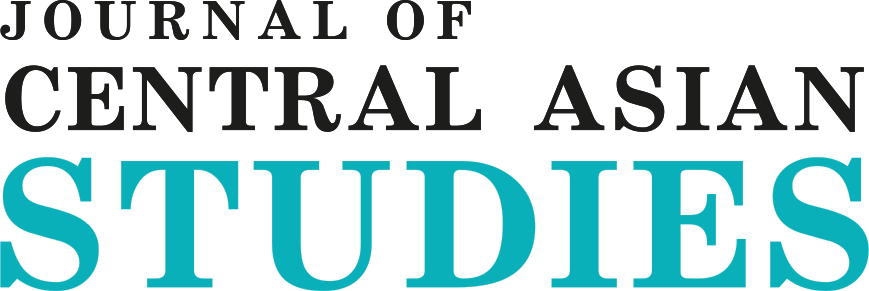Социальный капитал в Центральной Азии: как гражданское общество формирует демократию в регионе?
DOI:
https://doi.org/10.52536/3006-807X.2024-4.001Ключевые слова:
Центральная Азия, гражданское общество, демократизация, социальный капитал, социально-культурные институтыАннотация
Сети и взаимное доверие давно являются неотъемлемой частью традиций народов Центральной Азии. Коллективные культурные практики среди кочевых народов исторически служили важнейшими инструментами для их выживания. Социальный капитал влиял на различные аспекты общества Центральной Азии с советских времен. Несмотря на советизацию местных сообществ, традиционные социальные акторы продолжали существовать. После обретения независимости в 1991 году институты социального капитала сыграли важную роль в формировании процессов управления государствами Центральной Азии. Социальный капитал воплощает концепцию «правления снизу», которая является основополагающим компонентом
демократизации. Однако в Центральной Азии, хотя институты социального капитала являются додемократическими, они по-прежнему поддерживают демократические ценности. Неформальное общение, проявляющееся в различных формах по всему региону, остается одним из основных источников социального капитала. Эти формы могут служить носителями демократических ценностей. Однако также важно признать существование негативного социального капитала, который может отрицательно влиять на отдельных лиц или определенные социальные слои. Целью данной статьи является подчеркивание роли традиционного гражданского общества, которое представляет собой социальный капитал, в укреплении демократических ценностей в этих странах. Кроме того, в ней будет подчеркнута значимость неформальных социальных и исторических практик как элементов неоинституционализма в Центральной Азии. В этом исследовании будет использоваться методология обзора литературы, дополненная аналитическим
подходом автора для устранения пробелов в исследованиях и предоставления основанных на фактах идей.
Библиографические ссылки
Abramson, D. (2006). From Soviet to Mahalla: Community and transition in post-Soviet Uzbekistan. Ann Arbor, MI: UMI Research Press.
Aldridge, S., Halpern, D., & Fitzpatrick, S. (2002). Social capital: A discussion paper. London, England: Performance and Innovation Unit.
Aris, B. (2021). Uzbekistan’s Mahalla democracy. Bne IntelliNews. https://www.intellinews.com/uzbekistan-s-mahalla-democracy-229238/
Barisitz, S. (2017). Central Asia and the Silk Road: Economic rise and decline over several millennia. Cham, Switzerland: Springer.
Buxton, C. (2011). The Struggle for Civil Society in Central Asia: Crisis and Transformation. Sterling, VA: Kumarian Press.
Coleman, J. (1988). Social capital in the creation of human capital. The American Journal of Sociology, 94(s1), S95–S120. https://doi.org/10.1086/228943
Collier, P. (2002). Social Capital and Poverty: A Microeconomic Perspective. In The Role of Social Capital in Development, edited by T. Van Bastelaer, 19–41. Melbourne: Cambridge University Press.
Collins, K. (2002). Clans, pacts, and politics in Central Asia. Journal of Democracy, 13(3), 137–152. https://doi.org/10.1353/jod.2002.0041
Collins, K. (2003). The political role of clans in Central Asia. Comparative Politics, 35(2), 171–190.
Collins, K. (2004). The logic of clan politics: Evidence from the Central Asian trajectories. World Politics, 56(2), 224–261. https://doi.org/10.1353/wp.2004.0009
Dadabaev, T. (2013). Community life, memory, and a changing nature of Mahalla identity in Uzbekistan. Journal of Eurasian Studies, 4(2), 181-196.
Dadabaev, T., Ismailov, M., & Tsujinaka, Y. (2017). Social capital construction and governance in Central Asia: Communities and NGOs in post-Soviet Uzbekistan. Tsukuba, Japan: Palgrave Macmillan.
Darmenova, Y., & Koo, E. (2021). Toward local sustainability: Social capital as a community insurance in Kazakhstan. Journal of Eurasian Studies, 12(2), 113–121. https://doi.org/10.1177/18793665211038143
Dasgupta, P. (1988). Trust as a commodity. In D. Gambetta (Ed.), Trust: Making and breaking cooperative relations (pp. 49–72). Basil Blackwell.
Denison, Michael J. (2006). Why do Sultanistic regimes arise and persist? A Study of Government in the Republic of Turkmenistan: 1992-2006. Ph.D. Thesis, England: The University of Leeds.
Makarova, E. (1999). The Mahalla, civil society and the domestication of the state in Soviet and post-Soviet Uzbekistan. Workshop for Home-Grown Models of Civil Society in the Muslim World, Watson Institute for International Studies, Brown University.
Fukuyama, F. (1995). Trust: The social virtues and the creation of prosperity. New York, NY: Free Press.
Fukuyama, F. (2001). Social capital, civil society and development. Third World Quarterly, 22(1).
Honig, L. A. (2024). Civil Society. Central Asia in a Multipolar World Internal Change, External Actors, Regional Cooperation, edited by Jacob L. & S. Mayer, 203-216. Switzerland: Springer Nature.
Insebayeva, S. (2017). Social capital and liberal democracy. In T. Dadabaev et al. (Eds.), Social capital construction and governance in Central Asia: Communities and NGOs in post-Soviet Uzbekistan.
Iyer, S., Kitson, M., & Toh, B. (2005). Social capital, economic growth and regional development. Regional Studies, 39(8).
Kandiyoti, D. (2007). Post-Soviet institutional design and the paradoxes of the ‘Uzbek path.’ Central Asian Survey, 26(1), 31–48. https://doi.org/10.1080/02634930701423426
Kandiyoti, D., & Azimova, N. (2004). The communal and the sacred: Women’s worlds of ritual in Uzbekistan. Journal of the Royal Anthropological Institute, 10(2), 327–349.
Karimov, I. (1998). Uzbekistan on the threshold of the twenty-first century. New York, NY: St. Martin’s Press.
Kenzheahmetuly, S. (2007). Kazakh traditions and customs. Almatykitap.
Kudebayeva, A., Sharipova, A., & Sharipova, D. (2021). Social capital and subjective well-being in Central Asia. Europe-Asia Studies, 74(1), 101–124. https://doi.org/10.1080/09668136.2021.1973965
Kukeyeva, F., & Shkapyak, O. (2013). Central Asia's transition to democracy. Social and Behavioral Sciences, 81, 79-83. https://doi.org/10.1016/j.sbspro.2013.06.391
Kumlin, S., & Rothstein, B. (2005). Making and breaking social capital: The impact of welfare-state institutions. Comparative Political Studies, 38(4).
Lempp, J. & Mayer, S. (2024). Central Asia in a Multipolar World Internal Change, External Actors, Regional Cooperation. Springer.
Makulbayeva, G. & Sharipova D. (2024). Social capital and performance of public councils in Kazakhstan. Journal for Eurasian Studies, 0(0): 1:14. https://doi.org/10.1177/18793665241266260
Niyazbekov, N. (2017). Social capital in Kazakhstan: A case of Taldykorgan city [IFEAC working papers]. https://ifeac.hypotheses.org/files/2017/04/Social-capital-in-Kazakhstanv6-17-mars-2017_Niyazbekov.pdf
Paxton, P. (1998). Capitalizing on community: Social capital and the democratic society. Ph.D. dissertation, Department of Sociology, University of North Carolina, Chapel Hill, NC.
Paxton, P. (1999). Is social capital declining in the United States? A multiple indicator assessment. American Journal of Sociology, 105(1), 88–127. https://www.jstor.org/stable/10.1086/210268
Paxton, P. (2002). Social capital and democracy: An interdependent relationship. American Sociological Review, 67(2), 254–277. http://www.jstor.org/stable/3088895
Putnam, R. D. (1993). Making democracy work: Civic traditions in modern Italy. Princeton, NJ: Princeton University Press.
Putnam, R. D. (1995). Tuning in, tuning out: The strange disappearance of social capital in America. PS: Political Science & Politics, 28(4).
Rasanayagam, J. (2002). Spheres of communal participation: Placing the state within local modes of interaction in rural Uzbekistan. Central Asian Survey, 21(1), 55–70. https://doi.org/10.1080/02634930220127946
Roy, O. (2002). Soviet legacies and Western aid imperatives in the new Central Asia. In A. Sajoo (Ed.), Civil society in the Muslim world (pp. 123–148). London: IB Tauris.
Ryabkow, M. (2008). The North-South cleavage and political support in Kyrgyzstan. Central Asian Survey, 27(3-4), 301–316. https://doi.org/10.1080/02634930802536688
Sapsford, R., Abbott, P., Haerpfer, C., & Wallace, C. (2015). Trust in post-Soviet countries, ten years on. European Politics and Society, 16(4).
Scott, R. et al. (2009). The Origins of Social Capital Evidence from a Survey of Post-Soviet Central Asia. Comparative Political Studies, 42:707-732.
Sievers, E. W. (2002). Uzbekistan's Mahalla: From Soviet to Absolutist Residential Community Associations. Journal of International and Comparative Law, 2. https://studentorgs.kentlaw.iit.edu/jicl/wp-content/uploads/sites/5/2014/01/JICL-Sievers-Mahalla-final-for-publication.pdf
Toktomushev, K. (2018). One Belt, One Road: A new source of rent for ruling elites in Central Asia. In M. Laruelle (Ed.), China’s Belt and Road Initiative and its impact in Central Asia (pp. 77–85). Washington, DC: The George Washington University.
Toktomushev, K. (2023). Civil society, social capital, and development in Central Asia. Central Asian Survey, 42(4), 710–725. https://doi.org/10.1080/02634937.2023.2244528
Troschke, M. (2012). Social capital and the formation of a market economy: The case of Uzbekistan. In J. Ahrens & H. Hoen (Eds.), Institutional reform in Central Asia: Politico-economic challenges (1st ed., pp. 43–62). Abingdon, England: Routledge.
Urinboyev, R. (2014). Is there an Islamic public administration legacy in post-Soviet Central Asia? An ethnographic study of everyday Mahalla life in rural Ferghana, Uzbekistan. Administrative Culture, 15(2), 157–178. http://halduskultuur.eu/journal/index.php/HKAC/issue/view/17
Usmanov, J., & Naidenova, I. (2019). Professional and business associations. Civil Society Discussion Paper 3. University of Central Asia. https://ouci.dntb.gov.ua/en/works/lmj2wjo9/
World Bank. (2002). The context for community-driven development in Central Asia: Local institutions and social capital in Kyrgyz Republic, Tajikistan and Uzbekistan. Washington, DC: Author
World Bank Group (2021). Tajikistan country gender assessment. Washington, DC: Author. https://www.worldbank.org/en/country/tajikistan/publication/country-gender-assessment
Ziegler, C. E. (2015). Introduction. In C. E. Ziegler (Ed.), Civil society and politics in Central Asia (pp. 1–18). University Press of Kentucky.
Загрузки
Опубликован
Выпуск
Раздел
Лицензия
Copyright (c) 2024 Саини А.

Это произведение доступно по лицензии Creative Commons «Attribution» («Атрибуция») 4.0 Всемирная.










 Open content is licensed under the CC-BY
Open content is licensed under the CC-BY 


